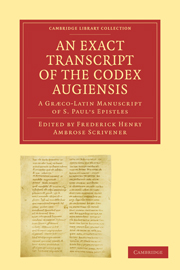 An Exact Transcript of the Codex Augiensis
An Exact Transcript of the Codex Augiensis Published online by Cambridge University Press: 05 November 2011
The term “Comparative Criticism” has been happily applied to that delicate and important process of investigation whereby we seek to trace the relative value and mutual connexion of the authorities upon which the Greek Text of the New Testament is based, whether they be manuscripts of the original, early versions, or citations by the Christian Fathers. Our accurate acquaintance with these authorities is very limited, much that we know about them being due to the exertions of scholars yet living: but we are sufficiently aware of the extent of the subject, and the minute and perplexing inquiries which beset the Biblical student at every step, not to seize with hearty welcome any clue that may promise to guide us through a labyrinth thus dark and doubtful. To this natural feeling, far more than to any external evidence or internal probability of the theories themselves, I would ascribe the favour extended to the schemes of recension promulgated by Griesbach and his imitators in the last generation. Men wished such compendious methods of settling the sacred text to be true, and as demonstrated truths they accordingly accepted them. These systems, bold, ingenious, imposing, but utterly groundless, I have elsewhere discussed at length (Collation of the Holy Gospels, Introd. Chap. i.); it were needless to revert to them, for I believe that no one at the present day seriously entertains any one of them.
To save this book to your Kindle, first ensure [email protected] is added to your Approved Personal Document E-mail List under your Personal Document Settings on the Manage Your Content and Devices page of your Amazon account. Then enter the ‘name’ part of your Kindle email address below. Find out more about saving to your Kindle.
Note you can select to save to either the @free.kindle.com or @kindle.com variations. ‘@free.kindle.com’ emails are free but can only be saved to your device when it is connected to wi-fi. ‘@kindle.com’ emails can be delivered even when you are not connected to wi-fi, but note that service fees apply.
Find out more about the Kindle Personal Document Service.
To save content items to your account, please confirm that you agree to abide by our usage policies. If this is the first time you use this feature, you will be asked to authorise Cambridge Core to connect with your account. Find out more about saving content to Dropbox.
To save content items to your account, please confirm that you agree to abide by our usage policies. If this is the first time you use this feature, you will be asked to authorise Cambridge Core to connect with your account. Find out more about saving content to Google Drive.